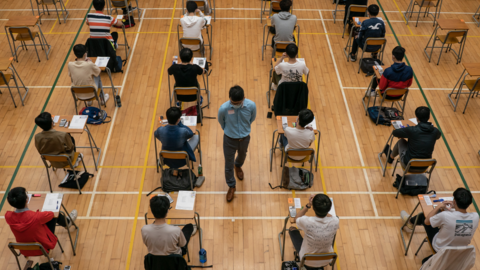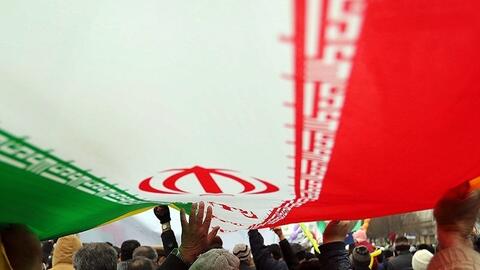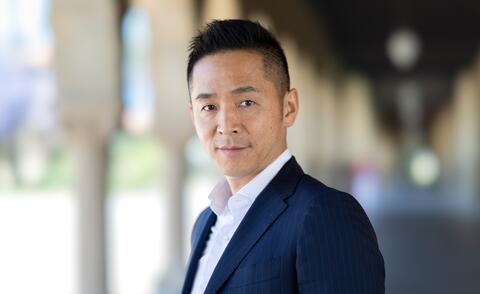Regional Expertise

Regional Expertise
Research Spotlight
Karen Eggleston
Beatriz Magaloni
Scott Rozelle
Kiyoteru Tsutsui
Trading stocks builds financial confidence and compresses the gender gap
- ,
The Connection between Sleep Patterns and Mental Health: Insights from Rural Chinese Students
- ,
- ,
- ,
- ,
- ,
- ,
Background: The association between sleep patterns and young students’ mental health, which is crucial for their development, remains understudied in rural China. Therefore, the relationship between sleep patterns and mental health among primary and junior high school students in rural China was examined. Method: A total of 1592 primary and junior high school students from rural areas of Gansu Province were surveyed, and the Depression Anxiety and Stress Scale (DASS) was utilized to assess mental health, alongside self-reported data on their daily sleep patterns. Results: Significant sleep inadequacies were identified: 28% of students received less than 8 h of sleep on weekdays, and 19% went to bed later than recommended. On weekends, 38% of students had delayed bedtimes, though only 7.2% received less than 8 h of sleep. Notably, a “U-shaped” relationship was uncovered between sleep duration and mental health for students on weekends, with optimal mental health correlated with receiving 10–11 h of sleep, while both shorter and longer sleep durations on weekends worsened outcomes. This pattern is absent on weekdays. Additionally, adequate sleep and an earlier bedtime was linked to a 6–8% decrease in mental health risks. Conclusions: These findings provide valuable insights for policymakers seeking to enhance student mental well-being in rural settings, emphasizing the importance of implementing measures that promote balanced sleep habits among young students.
New research casts doubt on a long-standing theory.
Can a Teacher Salary Increase Promote Students' Educational Performance?
- ,
- ,
- ,
Policymakers in China have attempted to improve the quality of rural education by investing in teacher salaries through initiatives like the Rural Teachers Support Plan (RTSP). This study estimates the effects of teacher salary increase on students' educational outcomes in rural China by utilizing the exogenous variations of rural teacher salaries induced by the RTSP. It employs an intensity-based difference-in-differences strategy and panel data from 2010 to 2018 with 3,351 rural children. The findings reveal that an increase in teacher salaries had a significant positive impact on students' examination results. Moreover, the results of mechanism analysis indicate that salary increases could have both quality and quantity effects on students' outcomes by increasing the proportion of highly educated teachers and reducing the student–teacher ratio. Our findings contribute to the discussion on the importance of teacher salary incentives in education production functions and provide insights for other countries undertaking rural education reforms.
Rural China and the Gender Gap in Early Social-emotional Development
- ,
- ,
- ,
- ,
Rural girls in China stay in school longer than boys and outperform them in many subjects. This gender gap suggests analogous disparities in early childhood development, a key factor in later educational outcomes. This study examines gender disparities in social-emotional development among 1,301 children aged 18–30 months in rural China. Results indicate that male children trail their female counterparts by 0.18 SD on average on the scale of standardized ASQ:SE score. A large share of the difference is driven by the bottom 10 % of children, where the magnitude of the gender gap (0.34 SD) is 1.9 times larger than at the median (0.19 SD). Demographic characteristics are uncorrelated with the gender gap in heterogeneity analysis, suggesting that the mechanisms underlying observed gender disparities are similar across rural Chinese households.
The new law seeks to regulate critical infrastructure operators responsible for “continuous delivery of essential services” and "maintaining important societal and economic activities."
Effects of Mindfulness and Life-Skills Training on Emotion Regulation and Anxiety Symptoms in Chinese Migrant Children: A Randomized Controlled Trial
- ,
- ,
- ,
- ,
- ,
- ,
- ,
- ,
- ,
Purpose
China’s rapid urbanization has been associated with increased mental health challenges, especially in rural-to-urban migrant children. This study evaluates the effects of mindfulness and life-skills (LS) training on emotional regulation and anxiety symptoms from a randomized controlled trial aimed at improving the mental health of Chinese migrant children.
Methods
Two intervention arms—mindfulness training (MT) and MT plus LS mentorship (MT + LS)—were compared to a waitlist control group of 368 migrant children aged 9–17 years. Volunteers were trained to deliver interventions to 285 migrant children in small groups of 15 for eight weeks weekly. Social integration varied: migrant children mixed with local children at public schools were considered highly integrated, those in migrant-only classrooms at public schools had intermediate levels of integration, and children in private migrant schools had low integration. Emotion regulation and anxiety symptoms were assessed preintervention, postintervention, and three months postintervention.
Results
Postintervention and compared to the control group, children with high social integration in the MT arm showed increased cognitive reappraisal ability (p < .05) but higher physical anxiety (p < .01). Children with high social integration in the MT + LS arm had lower anxiety symptoms of harm avoidance (p < .01) and physical anxiety (p < .05). Children with low social integration in the MT + LS arm showed lower cognitive reappraisal (p < .01) and poorer overall emotion regulation abilities (p < .01). Three months later, children with intermediate integration in the MT + LS arm had lower separation anxiety (p < .05) and harm avoidance anxiety (p < .05). No other groups showed significant improvements in emotion regulation or reducing in anxiety symptoms three months postintervention.
Discussion
Mindfulness and LS training may benefit Chinese migrant children who have higher levels of social integration but increase anxiety in those with lower social integration. Future research should consider the sociocultural context in which a treatment is implemented.
Electronic Media Exposure, Parental Language Input, and Child Vocalizations in Rural and Peri-urban China
- ,
- ,
- ,
- ,
- ,
To examine the association between electronic media exposure and parental language input, Language Environment Analysis technology was used to collect data on electronic media exposure and parental language input in 158 peri-urban and rural households with children aged 18–24 months in southwestern China. The sounds children made and the sounds they heard were quantified. Multiple linear regression and quantile linear regression were used to determine the relationship between electronic media and the outcomes of interest. The results showed that each hour of electronic media exposure was associated with reduced conversational turn count (p < .05) and child vocalization count (p < .05). A large share of the reduction was driven by the higher quantile of children. Reductions associated with electronic exposure were also observed in number of segments and conversational turns. These results may help explain the association between child electronic media exposure and language delay in an under-studied and at-risk population.
Tilly Goes to Church: The Religious and Medieval Roots of European State Fragmentation
Countering China’s Use of Private Firms in Covert Information Operations
- ,
- ,
- ,
The Shortage of Child Psychiatrists in Mainland China
- ,
- ,
- ,
- ,
- ,
- ,
- ,
- ,
- ,
- ,
Childhood is a crucial period of psychological and social development, rendering individuals susceptible to developing mental health issues. Unfortunately, many countries around the world, including China, are facing a shortage of child psychiatrists, which is a significant concern. This Comment was conducted to clarify the current number of child psychiatrists in mainland China, to analyze the reasons for the shortages and to provide constructive suggestions for solving the current shortage.
Rural-Urban Differences in the Intergenerational Transmission of Cognitive Capabilities in China: Evidence from a Northwestern Province of China
- ,
- ,
- ,
- ,
Purpose
Literature has shown that the intergenerational transmission of cognitive abilities is stronger for children raised in more advantaged environments. However, there has never been an empirical investigation of this pattern in China. This study examines differences in the intergenerational transmission of cognitive capabilities among mothers and young children in urban and rural subpopulations in China and investigates whether these differences are driven by differences in parental investment in the home environment.
Design/methodology/approach
Data collected from randomly selected 6- to 36-month-old babies and their mothers in a Northwestern province in China was used. Child capabilities were assessed by the Bayley Scales of Infant and Toddler Development (3rd edition). Maternal intelligence quotient (IQ) scores were assessed with the Raven’s Progressive Matrices test. The non-parametric regression methods were used to construct the factor scores of child capabilities. The ordinary least squares (OLS) models were employed to investigate the relations between child cognition, maternal IQ and parental investment.
Findings
In urban households, where most children are raised in a positive home environment, child cognitive scores are strongly correlated with maternal IQ. In rural households, where parental investments are lower and more variable, child cognitive scores are not significantly correlated with maternal IQ but are predicted by differences in parental investments in a cognitively stimulating home environment.
Originality/value
This study provides a unique contribution by utilizing rural–urban disparities in China as a unique natural experiment to investigate differences in the transmission of cognitive capabilities across socioeconomic status (SES). It also provides the first empirical evidence of SES differences in the intergenerational transmission of cognitive capabilities in a developing country. This study reveals that intergenerational mother–child cognition associations are disrupted by poor parental investment in rural households but not in urban households.
General Psychopathology Factor in Chinese Adolescents and its Correlation with Trans-diagnostic Protective Psycho-social Factors
- ,
- ,
- ,
- ,
- ,
- ,
- ,
Background
Comorbidity in mental disorders is prevalent among adolescents, with evidence suggesting a general psychopathology factor (“p” factor) that reflects shared mechanisms across different disorders. However, the association between the “p” factor and protective factors remains understudied. The current study aimed to explore the “p” factor, and its associations with psycho-social functioning, in Chinese adolescents.
Methods
2052 students, aged 9–17, were recruited from primary and secondary schools in Shanghai, China. Multiple rating scales were used to assess psychological symptoms and psycho-social functioning. Confirmatory factor analysis was conducted to verify the fit of models involving different psychopathology domains such as externalizing, internalizing, and the “p” factor. Subsequently, structural equation models were used to explore associations between the extracted factors and psycho-social functioning, including emotion regulation, mindful attention awareness, self-esteem, self-efficacy, resilience, and perceived support.
Results
The bi-factor model demonstrated a good fit, with a “p” factor accounting for 46 % of symptom variation, indicating that the psychological symptoms of Chinese adolescents could be explained by internalizing, externalizing, and the “p” factor. Psychologically, a higher “p” was positively correlated with emotion suppression and negatively correlated with mindful attention awareness, emotion reappraisal, self-esteem, and resilience. Socially, a higher “p” was associated with decreased perceived support.
Limitations
Only common symptoms were included as this study was conducted at school. Furthermore, the cross-sectional design limited our ability to investigate causal relationships.
Conclusions
A “p” factor exists among Chinese adolescents. Individuals with higher “p” factor levels were prone to experience lower levels of psycho-social functions.
Association Between Anxiety, Depression Symptoms, and Academic Burnout among Chinese Students: The Mediating Role of Resilience and Self-efficacy
- ,
- ,
- ,
- ,
- ,
- ,
- ,
- ,
- ,
Background: To explore the associations between anxiety and depression symptoms and academic burnout among children and adolescents in China, and to examine the role of resilience and self-efficacy in addressing academic burnout.
Methods: A total of 2,070 students in grades 4–8 were recruited from two primary and three middle schools in Shanghai, completed the Elementary School Student Burnout Scale (ESSBS), the Multidimensional Anxiety Scale for Children-Chinese (MASC-C), the Center for Epidemiological Studies Depression Scale (CES-D), the Connor-Davidson Resilience Scale (CD-RISC), and the General Self-Efficacy Scale (GSES), with 95.04% effective response rate. Multivariable regression analyses examining the associations between anxiety / depression symptoms and academic burnout (as well as the associations between resilience / self-efficacy and academic burnout) were performed using STATA 16.0 and SmartPLS 3.0.
Results: Anxiety symptoms (β = 0.124, p < 0.01) and depression symptoms (β = 0.477, p < 0.01) were positively correlated with academic burnout. Resilience partially mediated the association between depression symptoms and academic burnout (β = 0.059, p < 0.01), with a mediation rate of 12.37%. Self-efficacy partially mediated the associations between anxiety symptoms and academic burnout (β = 0.022, p < 0.01) and between depression symptoms and academic burnout (β = 0.017, p < 0.01), with mediation rates of 17.74% and 3.56%, respectively. Resilience and self-efficacy together (β = 0.041, p < 0.01) formed a mediating chain between depression symptoms and academic burnout, with a mediation rate of 8.6%.
Conclusions: Anxiety and depression symptoms were positively associated with academic burnout. Resilience and self-efficacy were found to mediate the associations partially.
Isolating the "Tech" from EdTech: Experimental Evidence on Computer Assisted Learning in China
- ,
- ,
- ,
EdTech, which includes computer assisted learning (CAL), online education, and remote instruction, was expanding rapidly even before the current full-scale substitution for in-person learning at all levels of education around the world because of COVID-19. Studies of CAL interventions often find positive effects, however, these “CAL programs” often include non-technology based inputs such as more time on learning and instructional support by facilitators in addition to technology-based components. In this paper, we discuss the possible channels by which CAL programs affect academic outcomes among schoolchildren. We isolate the technology-based effects of CAL from the total program effects by designing a novel multi-treatment field experiment with more than four thousand schoolchildren in rural China. For the full sample, we find null effects for both the total CAL program and the technology-based effects of CAL (which are measured relative to a traditional pencil-and-paper learning treatment) on math test scores. For boys, however, we find a positive and statistically significant effect of the CAL program, but do not find evidence of a positive effect for the technology-based effect of CAL. When focusing on grades, we find evidence of positive CAL program effects but find null effects when we isolate the technology-based effects of CAL. Our empirical results suggest that the “Tech” in EdTech may have relatively small additional effects on academic outcomes and yet that tech programs can substitute at least to a certain extent for traditional learning.
Maternal Empowerment, Feeding Knowledge, and Infant Nutrition: Evidence from Rural China
- ,
- ,
- ,
- ,
- ,
Background: Maternal empowerment - the capacity to make decisions within households - is linked to better child feeding and nutritional outcomes, but few studies have considered the mediating role of caregiver knowledge. Further, existing literature centres primarily on the husband-wife dyad while overlooking grandmothers as important childcare decision-makers.
Methods: We collected primary data through household surveys in 2019 and 2021 from 1190 households with infants zero to six months living in rural western China. We identified the primary and secondary caregivers for each infant and assessed their feeding knowledge and practices, as well as infant nutritional status. We constructed a maternal empowerment index using a seven-item decision-making questionnaire and examined the relationship between maternal empowerment in childcare and household decisions, caregivers' feeding knowledge, and infant feeding practices and nutritional outcomes.
Results: Mothers had significantly higher levels of feeding knowledge than secondary caregivers (most were grandmothers, 72.7%), with average knowledge scores of 5.4 vs. 4.1, respectively, out of 9. Mothers and secondary caregivers with higher levels of feeding knowledge had significantly higher exclusive breastfeeding rates by 13-15 percentage points (P < 0.01) and 11-13 percentage points (P < 0.01), respectively. The knowledge of secondary caregivers was even more strongly associated with not feeding formula (15 percentage points, P < 0.01). Mothers empowered to make childcare decisions were more likely to exclusively breastfeed (12-13 percentage points, P < 0.01), less likely to formula feed (9-10 percentage points, P < 0.05), and more likely to have children with higher Z-scores for length-for-age (0.32-0.33, P < 0.01) and weight-for-age (0.24-0.25, P < 0.05). Effects remained after controlling for maternal feeding knowledge.
Conclusions: While mothers' and grandmothers' feeding knowledge was both important for optimal infant feeding, grandmothers' knowledge was particularly critical for practicing exclusive breastfeeding. Given the disparity in feeding knowledge between the two caregivers, our study further shows that mothers empowered in childcare decision-making were more likely to exclusively breastfeed their infants. This implies that some mothers with adequate knowledge may not practice optimal feeding because of lower decision-making power. Overall, our study highlights the role of secondary caregivers (grandmothers) in infant care and suggests that future child nutritional interventions may benefit from involving secondary caregivers (grandmothers).
Analyzing And Editing Inner Mechanisms of Backdoored Language Models
- ,
The Other Half of ‘Chip 4’: Japan and South Korea’s Different Paths to De-risking
As Japan’s semiconductor revival is firing on all cylinders, South Korea must move past its dependence on China to find its groove again.
Human vs. Machine: Behavioral Differences Between Expert Humans and Language Models in Wargame Simulations
- ,
- ,
- ,
- ,
- ,







